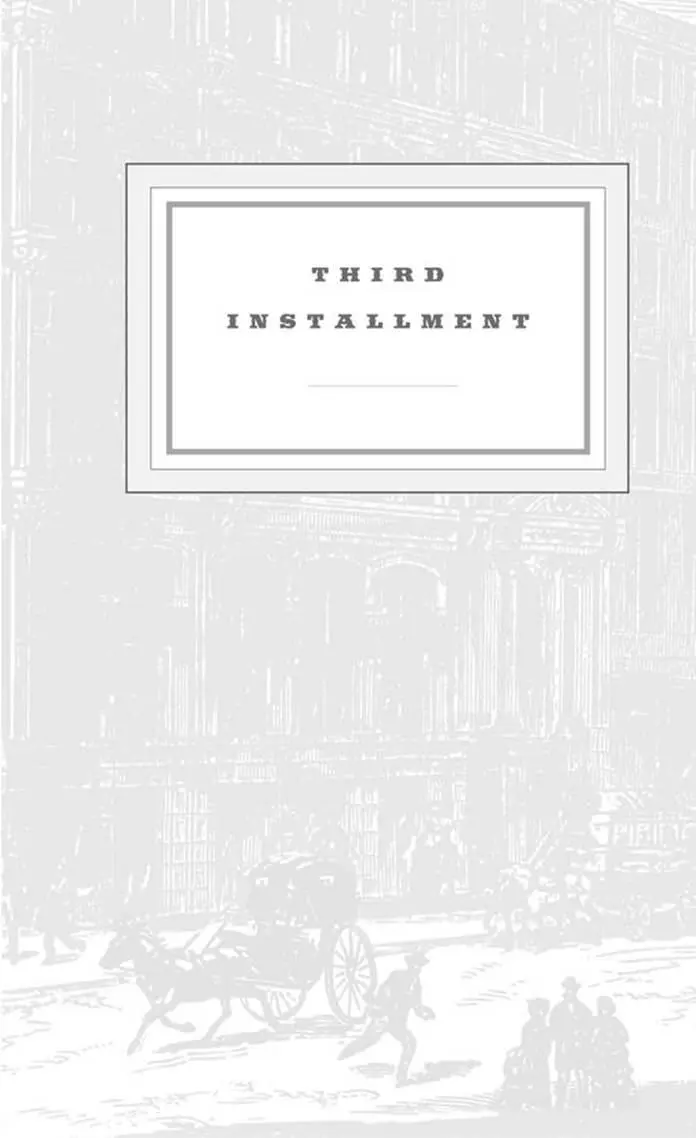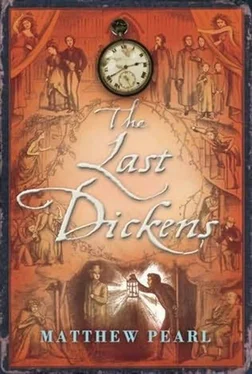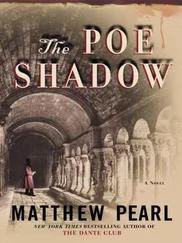A large object flew onto the platform and tumbled toward the speaker. Tom flinched. A bouquet of roses in every color.
His repair complete, Tom moved to go back down and found that his arm was lodged between two pipes. It would not budge. Below, Dickens closed his book and the audience broke into rapturous applause. Dickens bowed and left the stage.
Grimacing, Tom yanked his arm hard, cutting it on both sides on the old pipes as it pulled out. Righting himself, he hurried to the narrow stairs and descended as quickly as he could. The men and women rose from the seats as one-some to applaud, others to start toward the doors to get air, smoke, or exercise their legs before the second hour of reading. There was a blur of color as a woman vaulted herself onto the platform-no, not one, but four or five women, reaching their hands out to grab the geranium petals that had drifted down from Dickens's buttonhole during the reading.
Dolby came over to the side of the platform with a congratulatory smile directed toward Tom and a warmly extended hand, but Tom would not stop. As soon as he reached the hall, he broke into a blinding run up the steep floor of the theater, past the first gallery, to the second, and nearly leaping over two rows of seats he grabbed the woman's shoulders in a near embrace.
“You were the one who came into Mr. Dickens's room at Parker's?” Tom demanded.
She met Tom's accusatory gaze with her powerful stare. Then she smiled, and in a loud, irreverent voice, said, “You do think me odd!”
Tom could see the woman's carpetbag was stuffed with papers. He removed a few sheets. They were identical in size and type to the note he had found at Dickens's bed.
“It was you.”
She surrendered a slim smile. “You can see what nobody else does. Not my husband. You understand it. He needs me, the Chief , the Chief needs me. These others aren't fit for the likes of him at all.”
Tom was startled most of all by that one casual word: Chief. Boz, the Great Enchanter, the Inimitable, all were Dickens's nicknames with the worshipful public. But no one outside their circle called Dickens the Chief. How close had she been?
Suddenly her eyes turned dark and she sneered at him as though he had just spat on her. “You are the meanest and most unkind man.” Now she actually did spit at his face, with a look of disgust. “I have so many lots of friends, they are all more than kind to me and nobody who meets me forgets me. The Prince of Wales is a great, great friend and protector! The Chief shall be beloved again.” This last phrase she chanted to herself in eerily perfect imitation of Tom's light Irish brogue.
Tom now noticed that on the wooden back of the seat in front of hers, there were carvings. They were deep and had to be done with a knife. Words and phrases, quotes from Dickens's novels, ran into one another in mostly illegible patterns. The word Tom could make out by moving his fingers over the chair was “beloved.”
A crowd of spectators had begun to surround them by this point. Tom was digging through her carpetbag for the pearl-handled blade he had seen her holding in Brooklyn but stopped when he found a small pistol instead.
“It's not easy to love a man with the fire of genius,” she said confidentially, nodding toward the pistol. “His voice stays in my ears even when I don't want to hear it. ‘You have no idea what it is to have anybody wonderful fond of you,’ says he, ‘unless you have been got down and rolled upon by the lonely feelings.’
“Branagan?” Dolby cried, swimming upstream through the crowd. “Branagan, what is the meaning of this? People are pointing. Who is this woman? What are you doing, put that away! You'll cause a riot!”
The policeman who had stood guard with Tom earlier at the door also fought through the crowd with two officers behind him. Suddenly, they pushed Tom away.
“Stand aside!” one of them said.
“Officer,” Tom replied, “this woman entered Mr. Dickens's hotel room at the Parker House, I'd be bound she's the one who assaulted a widow in New York. She means him harm-there is a gun in there!”
The pistol was pulled from her bag by one of the policemen.
She nodded. “That is mine, Officer. Protection. In case anyone had in mind to steal my tickets for the reading. Now this is a spiteful-looking bald man, isn't it?” she said looking at Dolby. “Who are you?”
“You must take this woman away from Dickens immediately, officers,” Tom said.
“Thunder!” the policeman said with an astounded gasp at the situation, for a moment not knowing how to react. “Very sorry, Mrs. Barton,” he finally said, taking off his hat. He turned back to Tom. “You are a saucy Dubliner after all. Just like the newspapers said about your actions in Brooklyn. Haven't you any notion who this lady is?” he said, placing his emphasis on the word as a correction to a mere woman. “I hope for your sake she does not allege an assault.”
“See here!” Tom said, charging back toward her. “What does her name matter?”
“Mind our orders, Paddy boy, or I'll have to write to your mother to take you back home to look after the pigs.” The officer stepped in front of her to block Tom. “Stay away from her or we shall have to lock you up!”
“No need for that, Officer, no need at all,” said Dolby, taking Tom by the hand and lowering his voice to a whisper to hide the scene from any reporters. “A mere mistake on the good man's part. He'll re-turn to the hotel for the remainder of the reading.”
“Mr. Dolby!” Tom began to protest.
“Branagan!” Dolby growled. “Be silent now!”
“Oh, dear, all of that fuss over me. My property, sir?” Mrs. Barton said calmly. The police officer gave her the pistol. She took it, smiling eerily, and stored it in her strange carpetbag. “That Thomas is a sweet, sweet boy. He reminds me of a poem by… well, I can't remember by who. One of the tragic ones. There are too many poets these days.”
Dolby dragged Tom Branagan away through the aisles and tried to pull the porter's gaze away from the woman.
“Au revoir, Thomas,” she said with a wave. “As Mr. Weller says, ‘I came to look after you, my darlin’!’
“Keep Dickens away from her!” Tom called back helplessly to the policemen. “Keep Dickens away!”

***

Kent, England, June 30, 1870
JAMES R. OSGOOD AND HIS BOOKKEEPER REBECCA SAND FOUND no welcoming party or waving of handkerchiefs for them when the steamer reached the port in Liverpool. Osgood had expected that John Forster, Dickens's executor, or Frederic Chapman, Dickens's English publisher, might send a coach to meet them at the docks after receiving word from Fields of the visit. Instead, Mr. Wakefield, their business-minded companion from aboard the ship, seeing they were stranded and on their own, gallantly arranged their transportation to Higham station in the Kent countryside. He warned Osgood to receive a rate from their driver before hiring it or they'd face extortion. Before they boarded the carriage, Wakefield also recommended they find lodging at an inn called the Falstaff, “a fine little establishment- also the only one!”
In the ancient country town of Rochester, within the quaint and narrow streets Dickens seemed to be everywhere. On passing the church cemetery, the first tombstone one saw read DORRIT-there, Osgood surmised, Dickens might have first thought out Little Dorrit ‘ s story of greed and imprisonment. A shingle above a store on High Street spelled out BARNABY-and somewhere to match perhaps, there was “Rudge.”
Читать дальше














